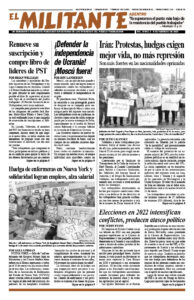If you tuned into “60 Minutes” on Jan. 1 you heard Paul Ehrlich, a Stanford University biologist, tell the audience, “I and the vast majority of my colleagues think we’ve had it; that the next few decades will be the end of the kind of civilization we’re used to.”
It’s the same prediction Ehrlich made in his 1968 bestseller The Population Bomb. “The battle to feed all of humanity is over. In the 1970s,” he wrote then, “hundreds of millions of people are going to starve to death.”
His book gave a patina of scientific legitimacy to policies of the World Bank, United Nations Population Fund and others used by governments to forcibly drive down fertility in the semicolonial world.
In Egypt, Tunisia, Pakistan, South Korea and Taiwan, health workers’ salaries were set by the number of intrauterine devices they inserted into women. Millions were sterilized in Mexico, Bolivia, Indonesia, Bangladesh and elsewhere. In the Philippines, according to Smithsonian Magazine, birth-control pills were pitched out of helicopters over remote villages.
In India, some states required sterilization for both men and women to obtain water, electricity, medical care and pay raises. More than 8 million men and women in India were sterilized in 1975 alone.
Today Ehrlich is joined by the likes of Greta Thunberg and other “climate activists” who insist we are on the precipice of “mass extinction.” Les Knight, founder of Voluntary Human Extinction, says the best thing humans can do to help the Earth is to stop having babies and die out. “Look what we did to this planet,” Knight told the New York Times. “We’re not a good species.”
Instead of pointing to the capitalist system whose profit drive condemns billions of human beings the world over to live with insufficient food, clothing, medical care, shelter and more, Ehrlich and others like him say the problem is too many people.
But we aren’t the problem. It’s our labor that transforms nature, and is the source of all wealth, and all advances in social productivity, culture and conservation. It’s a matter of how social labor is organized, to whose benefit, to what social and economic ends.
And that depends on which class holds state power, as the Socialist Workers Party explains in “The Stewardship of Nature Also Falls to the Working Class: In Defense of Land and Labor,” printed in New International no. 14.
“The dog-eat-dog laws of rival capitals ensure that every ‘energy policy’ implemented by corporations and bourgeois governments will serve the interests of maintaining capitalist rule,” the SWP statement says, “not the economic, social, and cultural needs of the earth’s population, nor the health and safety of the workers involved.
“Communists oppose anti-working-class” — and anti-scientific — “‘solutions’ promoted by big business and various bourgeois and petty-bourgeois reformers. We expose and counter their reactionary notion, for instance, that ‘too large’ a population of toilers — as well as too much consumption and too high living standards for many of them — is a threat to a ‘livable’ world.”
Today the spiraling costs of child care and rent and declining real wages have led more young men and women to hold off starting families in countries across the world. In the U.S. the birth rate plunged 4% from 2019 to 2020, the sharpest single-year decline in almost 50 years.
The employers’ ceaseless “productivity drives,” their speedup, job combinations and other “cost-cutting” measures increase injuries and kill workers in factories, mines and fields in the U.S. and worldwide.
“Only the leadership of a workers and farmers government, conquered in revolutionary struggle,” says the SWP statement, “can lead working people to even face confronting the vast worldwide pathologies of capitalism, let alone bring to bear their creativity, energies, discipline, and solidarity to cure them.”

